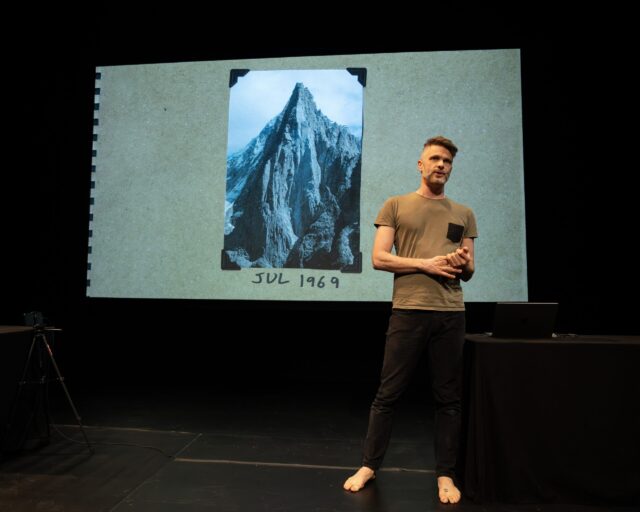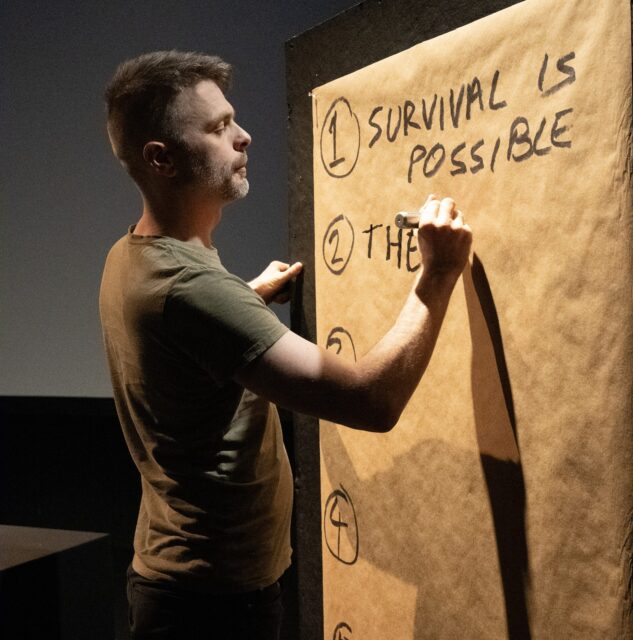
David Finnigan explores climate change and the past and future of humanity in multimedia solo show (photo by Joan Marcus)
DEEP HISTORY
The Shiva Theater at the Public Theater
425 Lafayette St.
Tuesday – Sunday through November 10, $75-$175
212-539-8500
publictheater.org
“Humanity didn’t come this far to only come this far,” David Finnigan says near the beginning of his one-man show Deep History, continuing at the Public’s Shiva Theater through November 10.
Finnigan, who hails from Ngunnawal country in Australia, has been investigating climate change for more than a decade in such plays as the controversial Kill Climate Deniers and Scenes from the Climate Era. He is also a climate risk consultant who works with the World Bank and sustainable finance NGOs, and his father is a leading micro-meteorologist who studies windflow over plant canopies. As he relates early in Deep History — which was called You’re Safe Til 2024: Deep History in previous iterations — his father is also a victim of climate change; he was a record-breaking mountain climber who suffered serious injuries in a horrific fall that occurred as a result of melting ice caps.
Across a well-paced seventy minutes, Finnigan takes the audience on a trip through six key moments in the development of humanity that brought us to where we are today, starting seventy-five thousand years ago, and relates them to the devastating 2019–20 Australian bush fires, specifically focusing on his best friend Jack Lloyd’s attempts to protect his family during Christmas week as fires surge around them. A barefooted Finnigan goes back and forth between two tables, one with a laptop with which he controls the light and sound and projects photos and videos on a large screen, and the other with a smartphone camera recording sugar pouring through a funnel, which builds a small mountain with each grain representing one hundred human beings.
Finnigan also tracks the soul of an imaginary woman who experiences all six turning points, told in poetic monologues accompanied by videos of the natural world. “She’s walking. / Under a dark sky, dark even in the day / She walks west across the grasslands,” he says. “The trick is to not think about it / just focus on what’s in front of her / and don’t think about / her little child, dead / her parents, dead / everyone dead / all gone, all ghosts.” He explains how his father considers humans to be only at their adolescent stage, his dad telling him, “If you compare the life of the human species to a human individual — you can see that this crisis we’re going into, the climate era, is just the next challenge to be survived for us to make it through to adulthood.”
Thus, Finnigan is not predicting doom and gloom and a coming apocalypse that will destroy the planet no matter what we do; instead, he remains positive, facing tomorrow and beyond with optimism. He states, “Look — we can decide the lessons we take from the past. . . . We choose what we take with us from what’s gone before.”

David Finnigan tracks six critical moments in time in Deep History at the Public (photo by Joan Marcus)
Directed by Annette Mees with video design by Hayley Egan and music by Reuben Ingall, who figures in the narrative, Deep History can at times feel like a TED talk; in fact, at a fortieth anniversary TED Conference in Vancouver in April, Finnigan delivered the ten-minute lecture “A Controversial Play — and What It Taught Me About the Psychology of Climate.” But onstage at the Shiva Theater, Finnigan is warm and personable, making direct eye contact with everyone in the audience, inviting them into this critically important story that he laces with charm and humor. He playfully spins around when he is switching from 2019 David to 2024 David, and he drops the marker he uses to update a chart that shares insight from each of the six key moments, the sharp noise ensuring we are paying attention.
Finnigan (Are You Ready to Take the Law into Your Own Hands, 44 Sex Acts in One Week) is relaxed and engaging before the show as well, hanging around the seating area, saying hello to people; I spoke with him briefly about my 2018–19 trip to Australia and diving at the Great Barrier Reef, which is in danger because of global warming. He’s also in the midst of a major project with the Public, The Seventh Assessment: A History of Climate Change in Seven Dance Parties, which is scheduled for 2028, when the United Nations Intergovernmental Panel on Climate Change will release its next comprehensive synthesis report.
In addition, the Public has partnered with Broadway Green Alliance and Wearable Collections to set up places in the lobby where visitors can reuse, recycle, and repurpose clothing and shoes.
Can art make a difference in the future of the planet, especially if it incorporates actual science? It certainly can’t hurt, as Finnigan ably demonstrates.
[Mark Rifkin is a Brooklyn-born, Manhattan-based writer and editor; you can follow him on Substack here.]